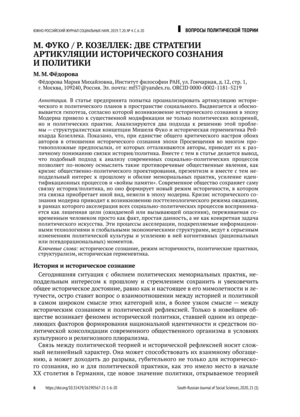Аннотация
В статье предпринята попытка проанализировать артикуляцию исторического и политического планов в пространстве социального. Выдвигается и обосновывается гипотеза, согласно которой возникновение исторического сознания в эпоху Модерна привело к существенной модификации не только политических воззрений, но и политических практик. Анализируются два подхода к решению этой проблемы — структуралистская концепции Мишеля Фуко и историческая герменевтика Рейнхарда Козеллека. Показано, что, при единстве общего критического настроя обоих авторов в отношении исторического сознания эпохи Просвещения во многом противоположные предпосылки, от которых отталкиваются авторы, приводят их к различному пониманию связки история/политика. Вместе с тем в статье делается вывод, что подобный подход к анализу современных социально-политических процессов позволяет по-новому осмыслить такие противоречивые общественные явления, как кризис общественно-политического проектирования, презентизм и вместе с тем неподдельный интерес к прошлому и обилие мемориальных практик, усиление идентификационных процессов и «войны памяти». Современное общество сохраняет саму связку история/политика, но оно формирует новый режим историчности, в котором эта связка приобретает иной вид, нежели в эпоху модерна. Кризис исторического сознания модерна приводит к возникновению посттелеологического режима ожидания, в рамках которого акселерация всех социально-политических процессов воспринимается как лишенная цели (ожидаемой или вызывающей опасения), переживаемая современным человеком просто как факт, простая данность, а не как конкретная задача политического искусства. Эти процессы акселерации, подкрепляемые информационными технологиями и глобальными экономическими структурами, ведут к серьезным изменениям политической культуры и усилению в ней когнитивных (рациональных или псевдорациональных) моментов.
Ключевые слова
Библиографические ссылки
Блок, М. (1973). Апология истории или Ремесло историка. М.: Наука.
Дьяков, А.В. (2010). Мишель Фуко и его время. СПб.: Алетейя.
Жильсон, Э. (2001). Дух средневековой философии. М.: Институт философии, теологии и истории св. Фомы.
Козеллек, Р. (2004). Можем ли мы распоряжаться историей? (Из книги «Прошедшее будущее. К вопросу о семантике исторического времени»). Отечественные записки, 5. Режим доступа http://www.strana-oz.ru/2004/5/mozhem-li-my-rasporyazhatsya-istoriey-iz-knigi-proshedshee-budushchee-k-voprosu-o-semantike-istoricheskogo-vremeni
Мейнеке, Ф. (2004). Возникновение историзма. М.: РОССПЭН.
Сунгуров, А.Ю. (2016). Время и политика: введение в хронополитику. СПб.: Алетейя.
Фуко, М. (2004). Археология знания. СПб, Гуманитарная Академия.
Фуко, М. (2005). Нужно защищать общество. СПб.: Наука.
Фуко, М. (1996). Ницше, генеалогия, история. В Философия эпохи постмодерна. Сб. переводов и рефератов. М.: Красико-принт.
Фуко, М. (2002). Что такое Просвещение. В М. Фуко Интеллектуалы и власть: Избр. полит. статьи, выступления и интервью в 3‑х тт. Т. 1 (C. 335–359). М.: Праксис
Фуко, М. (2006). Субъект и власть. В М. Фуко Интеллектуалы и власть. Т. 3. М.: Праксис.
Федорова, М.М. (2007). Понятие политического в контексте феноменологической критики философии истории. Полис, 4, 66–82.
Barash, J.A. (2004). Politiques de l’histoire. P.: Presses Universitaire de France.
Bantigny, L. (2015). La fin de l’histoire n’aura pas lieu. Écrire l’histoire, 15. Retrieved from http://journals.openedition.org/elh/570.
Behrent Michael, C. (2013). Penser le XXe siècle avec Michel Foucault. Revue d’histoire moderne & contemporaine, 60–4/4, 7–28. DOI: 10.3917/rhmc.604.0007
Dosse, F. (2013). Le moment structuraliste ou Clio en exil. Le Vingtieme siècle. Revue d’histoire, 1(117), 133–147.
Ewing, A.B. (2016). Conceptions of Reinhard Kozelleck’s Theory of Historical Time in the Thinking of Michael Oakeshott. History of Europeen Ideas, 42(3), 412–429. DOI: 10.1080/01916599.2015.1118331
Edwards, J. (2007). The Ideological Interpellation of Individuals as Combatants: An Encounter between Reinhart Kozelleck and Michel Foucault. Journal of Political Ideologies, 12(1), 49–66 DOI: 10.1080/13569310601095606
Foucault, M. (1990). Qu’est-ce que la critique? Critique et Aufklärung. Bulletin de la société française de philosophie, 84(2). Retrieved from http://www.scribd.com/doc/56577710/Foucault-Qu-est-Ce-Que-La-Critique
Hazard, P. (1961) La crise de conscience européene (1680–1715). P.: Boivin et Cie.
Kozelleck, R. (1979). Regne de la critique. P.: Ed. de Minuit.
Gusdorf, G. (1971). Les Principes de la pensée au sciècle des Lumières. P.: Payot.
Lefort, C. (1972). Le travail de l’oeuvre. Machiavel. P., Gallimard.
Massonet, S. (2016). Michel Foucault et l’histoire de la pensée critique. Acta fabula, 17(6). Retrieved from http://www.fabula.org/revue/document9942.php
Nora, P. (2018). L’histoire était le milieu intellectual de Foucault. L’histoire. Retrieved from https://www.lhistoire.fr/%C2%AB%C2%A0lhistoire-%C3%A9tait- le-milieu-intellectuel-de-foucault%C2%A0%C2%BB
Olsen, N. Schmitt, C. (2011). Reinhart Kosellek and the Foundations of History and Politics. History of European Ideas, 37(2), 197–208.


